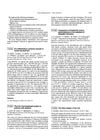Pro-Inflammatory Cytokine Cascade in Human Plucked Hair
September 1997
in “
JEADV. Journal of the European Academy of Dermatology and Venereology/Journal of the European Academy of Dermatology and Venereology
”
pro-inflammatory cytokine IL-1-Receptors IL-1a IL-1B TNFα IL-6 MCAF MCP-3 IL-8 anagen hair Alopecia Areata Alopecia Androgenetica anti-IL-1 strategies inflammatory cytokine interleukin-1 receptors interleukin-1 alpha interleukin-1 beta tumor necrosis factor alpha interleukin-6 monocyte chemotactic and activating factor monocyte chemoattractant protein-3 interleukin-8 hair growth phase androgenic alopecia anti-interleukin-1 treatments

TLDR Anti-IL-1 treatments might help with certain types of hair loss in people with high inflammation.
The study "FC053 Pro-inflammatory cytokine cascade in human plucked hair" demonstrated that freshly plucked human anagen hair expressed both type 1 and type 2 IL-1-Receptors mRNAs. The functional IL-1-Receptor type 1, when stimulated with IL-1a, induced mRNAs for inflammatory cytokines IL-1B, TNFα, IL-6, and chemokines MCAF, MCP-3, and IL-8. Additionally, IL-1a dose-dependently inhibited the growth of dissected human anagen hairs in vitro. A rapid assay identified that 33% of 116 volunteers had high inflammatory potential in their hair follicles. These findings suggested that anti-IL-1 strategies could be therapeutically relevant for treating Alopecia Areata and Alopecia Androgenetica in highly inflammatory individuals.





